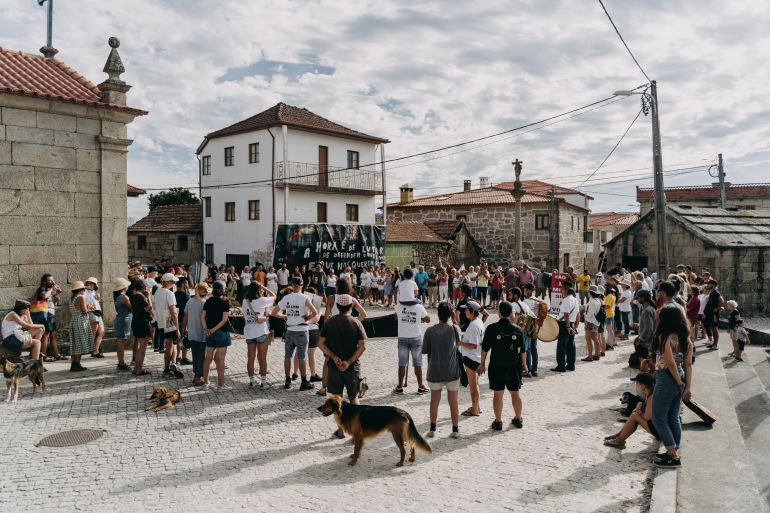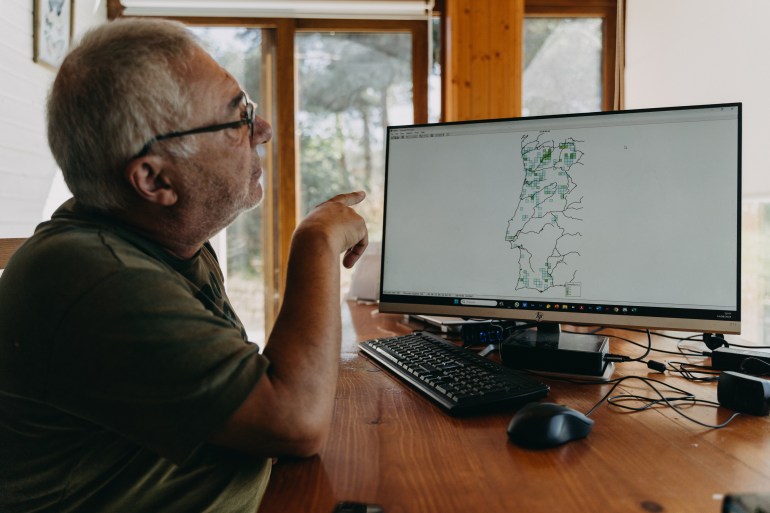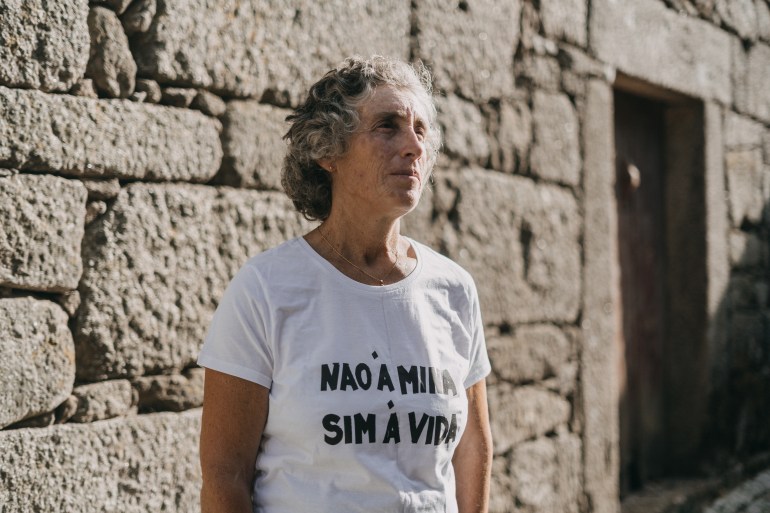Europe’s thirst for lithium threatens livelihoods, biodiversity in Portugal
Open-pit mines are planned for Portugal’s northern region, worrying locals who say their livelihoods are at risk.

Covas do Barroso, Portugal – Paulo Pires walked up the hill with his flock of sheep and dogs on a warm day in August, as a stream of water gushed down an ancient irrigation channel that has been maintained by local communities over many generations.
“There is a lot of wealth here,” said Pires, now resting in the shade of an oak tree by the flowing water.
Keep reading
list of 4 itemsArgentina’s ‘white gold’: Will its lithium boom end badly?
Chile bets on becoming world lithium leader as demand rises
Bolivia taps China, Russia in bid to unlock huge lithium riches
For centuries, Covas do Barroso’s water, pastures and forests have been managed collectively to integrate farming, livestock and forestry in a sustainable manner.
But Pires is worried.
Savannah Resources, a company based in the United Kingdom, aims to develop Western Europe’s largest open-pit lithium mine in Barroso, bordering the Peneda-Geres National Park in northeastern Portugal.
“When I was a child I used to come here with my friends and we bathed in the spring,” said Pires, pointing to an area littered with plastic pipes and blasted rocks, the remnants of lithium prospection carried out in 2017 in the village’s common lands.
Pires first saw the wounds opened by the search for minerals and has since felt a sense of dread thinking about an open-air mine on his doorstep.

“We’re afraid of the noise, of the dust, of water contamination. Where will I take my sheep?” he said.
The lithium mine could threaten the pastures and mountainsides that Pires’s livelihood depends on. It could also harm his home in the village of Romainho a few hundred metres away from the proposed mining site.
In May, Savannah Resources received preliminary approval from Portuguese authorities to develop an open-pit lithium mine on about 840 hectares (2,076 acres), three-quarters of which is community-owned land.
Lithium for Europe
The mountainous region of Barroso is believed to contain some of Europe’s most significant resources of lithium, a key component in batteries to power electric cars and store renewable energy.
The Savannah Resources project is expected to produce enough lithium for about half a million electric car batteries each year.
Under the banner of a “green transition”, the race for lithium has accelerated around the world.
The European Commission has estimated that demand for lithium will grow 60 times by 2050. Maros Sefcovic, the Commission’s vice president, said climate goals cannot be achieved without critical materials like lithium.
To prevent the European Union from being dependent on outside countries, the EU’s Critical Raw Materials Act aims to facilitate mining activities and set a target that at least 10 percent of Europe’s raw materials should come from local supplies.
“It’s an extraordinary opportunity,” said Ana Fontoura Gouveia, Portugal’s secretary of state for energy and climate, who believes the country’s mineral resources will play a key role in the EU’s ambition to secure more of the battery value chain.
According to Gouveia, lithium could generate 9 billion euros ($9.8m) in investment.
Another company, Lusorecursos, received the green light from Portugal’s environmental agency in September to open a lithium mine inside the Geres-Xures Transboundary Biosphere Reserve, which is a few kilometres from Covas do Barroso.
Prospection and exploration requests have surged in recent years.

Portuguese authorities announced they would launch an international public auction of lithium mining concessions, but the sale has been repeatedly postponed over concerns about the social and environmental impact of mining – and a recent corruption probe.
In November, an investigation into alleged corruption related to lithium mining, hydrogen and data centre projects led to the resignation of Portuguese Prime Minister Antonio Costa after prosecutors detained his chief of staff. The former secretary of state for energy and president of the Portuguese environmental agency were named suspects.
Campaigns by local communities against lithium mining have urged authorities to suspend all lithium projects, which they say lack transparency. But prospection works have continued in Barroso, even as governmental buildings and the companies’ offices were searched.
Savannah Resources says the project in Barroso could create hundreds of jobs and contribute more than 1 billion euros ($1.09bn) to Portugal’s gross domestic product. But the promises of economic development have failed to convince locals, who fear mining will destroy their livelihoods and bring short-term profits to only a few.
“We already have jobs,” said Alfredo Cadime, a producer of Barrosa beef, a prized breed of native cattle. “We have pure air, clean water, good-quality products. This is what we need to invest in.”
Barroso is the only region in Portugal – and one of only eight in Europe – recognised by the Food and Agriculture Organization (FAO) as a Globally Important Agricultural Heritage System of outstanding landscapes that combine agricultural biodiversity, resilient ecosystems and a valuable cultural heritage.
Locals fear the proposed mine will be open for only about 10 years but will leave behind a scarred landscape that could take centuries to recover.
Environmental impact
While Portugal’s central government has defended the project as an important asset, local authorities are less enthusiastic about plans to blast Barroso’s hills and dig out giant pits in a region renowned for its agricultural heritage.
“Our ancestors left us a very rich heritage,” said Fernando Queiroga, the mayor of Boticas municipality, which includes Covas do Barroso. “Will I leave my children a devastated land?”
A vocal opponent of the mining project, Queiroga has vowed to use all means to stop it, including legal challenges to halt the operations.
Savannah Resources has promised to follow “the best quality standards” and comply with all regulations. Locals bemoan what they call an absence of transparency and say they were not consulted about the mining plans.
For Nuno Forner, from the environmental association ZERO, the public lack of trust in mining companies is understandable given the industry’s long history of environmental destruction and lack of accountability.
“There are 199 abandoned mines and many continue to affect local populations today,” he said.
Several companies would rather pay a fine than subsidise the rehabilitation of mining territories.
Speaking at a conference on so-called “green mining” held in Lisbon in 2021, Peter Handley, the head of the European Commission’s raw materials unit, said mining in the past was a “very dirty operation” that is becoming “highly technological these days”.
“Open-pit mining, heavy machinery powered by fossil fuels, hundreds of trucks on the roads. How can any of this be called green?” asked Queiroga. “Green is what we have: our forests and our landscapes which will be destroyed by this project.”
Experts have raised concerns about the cumulative impact of the two large-scale mining projects on local ecosystems, biodiversity and threatened species.
“Barroso is a biodiversity hot spot with a mosaic of meadows and forests. There are 106 species of butterflies, including some of the rarest in Europe. They may disappear if their habitats are destroyed,” warned Ernestino Maravalhas, a lepidopterist who has published several books on Barroso’s biodiversity.
In addition to having indigenous livestock breeds and the rare Garrano horse, Barroso is home to important populations of Iberian wolf, a priority species classified as endangered, and critically endangered freshwater pearl mussels.
Environmentalists argue the anticipated harms far outweigh the benefits of lithium mining in Barroso.
“The impacts on the territory, on water and on people’s health will be very significant,” said Forner.
A green transition should include rethinking the way we use the earth’s limited resources, he said.
“We need to reduce the quantity of private vehicles and invest in public transport. Replacing one car with another won’t really solve our problems.”